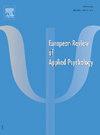到底什么是目标阻碍?概念验证研究
IF 1.4
4区 心理学
Q3 PSYCHOLOGY, APPLIED
European Review of Applied Psychology-Revue Europeenne De Psychologie Appliquee
Pub Date : 2025-09-01
DOI:10.1016/j.erap.2024.101043
引用次数: 0
摘要
目标阻碍是解释领导者对员工采取破坏性行为的核心(Krasikova et al., 2013)。事实上,当领导者未能实现他们的目标时,他们可能会对这种挫折的根源使用破坏性行为。尽管这种解释在破坏性领导的文献中很受欢迎,但据我们所知,目标阻碍的结构从未被定义过,甚至从未与类似的结构(例如挫折)区分开来。目的:本研究旨在(1)对目标阻塞构念进行概念验证(如文献综述、定义、与其他构念的区别以及验证其可操作性);(2)对其测量进行心理测量验证(信度、判别效度和标准效度)。方法我们遵循Locke(2012)的方法来评估概念效度,并通过一系列相关和验证性因素分析来测试目标阻塞测量的心理测量特性。本研究采用法语问卷进行。结果目标阻塞有了明确、准确的定义,其测量方法也得到了充分的验证,可用于研究目的。现在轮到研究人员来实证评估目标阻塞在各种感兴趣的现象中的含义,包括领导者的反应和员工对破坏性领导形式的暴露。本文章由计算机程序翻译,如有差异,请以英文原文为准。
What is goal blockage, really? A conceptual validation study
Introduction
Goal blockage is at the heart of explanations for the adoption of destructive behaviors by leaders towards their employees (Krasikova et al., 2013). Indeed, when a leader fails to achieve their goals, they may use destructive behaviors towards the source of this frustration. Despite the popularity of this explanation in the literature of destructive leadership, the construct of goal blockage has, to our knowledge, never been defined or even distinguished from similar constructs (e.g., frustration).
Objective
This study aims (1) to conduct a conceptual validation of the goal blockage construct (e.g., literature review, definition, differentiation from other constructs, and verification of suitability with its operationalization), and (2) to perform a psychometric validation of its measure (reliability, discriminant and criterion validity).
Method
We followed Locke's (2012) methodology to assess conceptual validity and we tested the psychometric properties of a goal blockage measure through series of correlational and confirmatory factor analyses. This research was conducted with French questionnaires.
Results
Goal blockage now has a clear and precise definition and its measure has been thoroughly validated and can be used for research purposes.
Conclusion
The ball is now in the researchers’ court in order to empirically assess the implication of goal blockage in various phenomena of interest, including leaders’ reactions and employees’ exposure to destructive forms of leadership.
求助全文
通过发布文献求助,成功后即可免费获取论文全文。
去求助
来源期刊

European Review of Applied Psychology-Revue Europeenne De Psychologie Appliquee
PSYCHOLOGY, APPLIED-
CiteScore
2.20
自引率
20.00%
发文量
38
期刊介绍:
The aim of the Revue européenne de Psychologie appliquée / European Review of Applied Psychology is to promote high-quality applications of psychology to all areas of specialization, and to foster exchange among researchers and professionals. Its policy is to attract a wide range of contributions, including empirical research, overviews of target issues, case studies, descriptions of instruments for research and diagnosis, and theoretical work related to applied psychology. In all cases, authors will refer to published and verificable facts, whether established in the study being reported or in earlier publications.
 求助内容:
求助内容: 应助结果提醒方式:
应助结果提醒方式:


